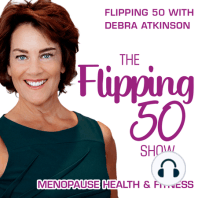26 min listen

Living Longer is NOT the Goal: Research on Longevity
Living Longer is NOT the Goal: Research on Longevity
ratings:
Length:
26 minutes
Released:
Jun 27, 2023
Format:
Podcast episode
Description
Living well, not living longer ought to be the goal. Everywhere I turn though this is the longevity economy. What can I do to live longer? What can I take? What’s my real age? Interest in Flipping 50’s genetic test for chronological vs biological age and what to do about it is peaking. We want to know, are we slowing the biological process of aging, or accelerating it? In this episode some research about where we are in regard to activities related to living longer well. The State of Women in Menopause Actively Seeking Living Longer Among women 45–64 years and 65–74 years old, only 18% and 11%, respectively, perform physical activities that enhance and maintain muscle strength and endurance two or more times per week. Right at the time – 60 when loss of muscle accelerates from the average 3-8% loss a decade to greater than that 1-2%. Not only is life making it easier to lose muscle, but women are also barely exercising enough to offset it. The answer is starting sooner. Imagine your cell phone. Where is it? Chances are it’s within arm’s length or I just made you nervous by asking. You’re not going to put that down when you turn 60, or 70, or 80. There’s no age when that will be something you don’t do. Why? Because you’ve become attached to it and it’s a habit. Strength Training is the Panacea of Reversing (Biological Aging) And so too can strength training. You aren’t going to stop doing it if you’ve begun it. If you wait until 60 or 70, starting then is better than not starting, but will be harder than beginning at 45 or 50, or 55 when you’ve already got more muscle, more energy, and potentially more urgency (due to weight gain or belly fat that occurs in menopause). If you live with it for too long, chances are you will be adopting a mentality you settle for it. I’ve heard women say, maybe they have to accept it. Not really my people. I think you accept it only if you aren’t willing to make the healthy habits to change it. Now, that is a choice. I can get behind that. You’re saying, it’s more important to me to drink wine every evening than to have what I say I want in regard to body weight or fat. Perception of lack of time/too busy is the #1 reason for dropout (44%) But once you start, if you’re older… you’ll stick with it. For every decade of life, we’re 10x more likely to stick with it. If you haven’t had a lifetime of physical activity or an active lifestyle, help yourself with a coach, a program, and accountability. Because you are less likely to stick with it than someone who has that relationship with being active. One crucial component is the skill level and leadership of the program: the competency of your leader. That’s like comparing an influencer who sells makeup, talks about home décor who also shows you her workout vs a fitness professional who can discuss the science of movement and biomechanics so you don’t get hurt. Immediately, it may not matter. But long term, if you’re not confident what you’re doing helps or don’t know why, most of us are not willing to keep investing time and energy. What’s True for You? Evaluate your current routine and where it came from. Do you know every move, every set, and sequence of moves is designed for taking you from where you are to where you want to go? Rate it on a 0-4 scale, 0 being “not at all.” This could be a big factor in your willingness to stick to it long-term. There are “challenges” all over. Like, P90x, or 75 hard. And yet there’s nothing behind the science of who should, who is throwing themselves under the bus by doing them, and who is the ideal candidate. All exercise is not appropriate for all bodies. At 60 minutes .. cortisol begins to rise and does not have a corresponding reduction for women in midlife (and potentially men in andropause). This is muscle-wasting and adrenal stress both. We’re talking far beyond, “Everyone can walk.” We also want to address the sheer volume of exercise at levels that may not al
Released:
Jun 27, 2023
Format:
Podcast episode
Titles in the series (100)
Living Longer is NOT the Goal: Research on Longevity: Living well, not living longer ought to be the goal. Everywhere I turn though this is the longevity economy. What can I do to live longer? What can I take? What’s my real age? Interest in Flipping 50’s genetic test for chronological vs... by The Flipping 50 Show